Ministry of Health and Family Welfare
India rolls out National Viral Hepatitis Control Program
Our aim is to provide paperless and pocket-less health care for all: MoS. Health & Family Welfare, Shri Ashwini Kumar Choubey
I am a living example of a Hepatitis B victim; need to pay a lot of attention to detection, treatment and public awareness: WHO-SEARO Goodwill Ambassador Shri Amitabh Bachchan
Technical Guidelines for Diagnosis and Management of Hepatitis B will help ensure consistency in diagnosis and treatment of the disease: Health Secretary
Posted On:
24 FEB 2019 4:48PM by PIB Mumbai
In line with the Government of India’s deep commitment towards elimination of viral hepatitis, the “National Action Plan – Viral Hepatitis” was launched by Union Minister of State, Health & Family Welfare, Shri Ashwini Kumar Choubey in Mumbai today. Minister for PWD and Public Health & Family Welfare, Government of Maharashtra, Shri Eknath S. Shinde; and Guest of Honour and Goodwill Ambassador for Hepatitis, WHO SEARO region, Shri Amitabh Bachchan were also present on the occasion.
Viral hepatitis is recognized as an important public health problem across the world. According to WHO estimates, viral hepatitis caused 1.34 million deaths globally in 2015, a number comparable to deaths due to tuberculosis, worldwide. In India, it is estimated that there are 4 crore people suffering from Hepatitis B and 0.6-1.2 crore people suffering from Hepatitis C.
The National Action Plan was developed by experts from across the country, in line with India’s commitment and keeping the global perspective in mind. The Plan provides a strategic framework, based on which National Viral Hepatitis Control Program was framed and launched in July, 2018 under National Health Mission by Ministry of Health & Family Welfare. This program is also in line with our global commitment towards achieving Sustainable development Goal (SDG) 3.3. India has affirmed this commitment at the 69th World Health Assembly.
India is one of the few countries in the world to roll out management of Hepatitis B and hepatitis C in a public health approach and offer free diagnostics and drugs lifelong to its beneficiaries.
The aim of the program is to combat hepatitis and achieve countrywide elimination of Hepatitis C by 2030, achieve significant reduction in the infected population, morbidity and mortality associated with Hepatitis B and C viz. Cirrhosis and Hepato-cellular carcinoma (liver cancer) and Hepatitis A and E.
Integrating the interventions within the existing health systems framework under National Health Mission are further complementing the efforts of increasing access to testing and management of viral hepatitis.
Coordination and collaboration with other national programs and schemes to provide a promotive, preventive and curative package of services will further augment the government of India’s determined efforts towards achieving the goal.
The Minister also released the Technical Guidelines for Diagnosis and Management of Hepatitis B. Many countries have achieved outstanding coverage with the hepatitis B vaccine, scoring an early win for prevention. In India, Hepatitis B vaccine was introduced in the Universal Immunization Program almost a decade ago. Since healthcare workers and high-risk groups by virtue of their occupation and behavior are more vulnerable to acquiring infection, it is envisaged to extend the beneficiaries for this vaccine to healthcare workers and high-risk groups under the NVHCP. Focus under the program is also on screening of pregnant women for hepatitis B, in places where institutional delivery is less than 80%, to ensure provision of birth dose hepatitis B vaccination and Hepatitis B immunoglobulin, if required.
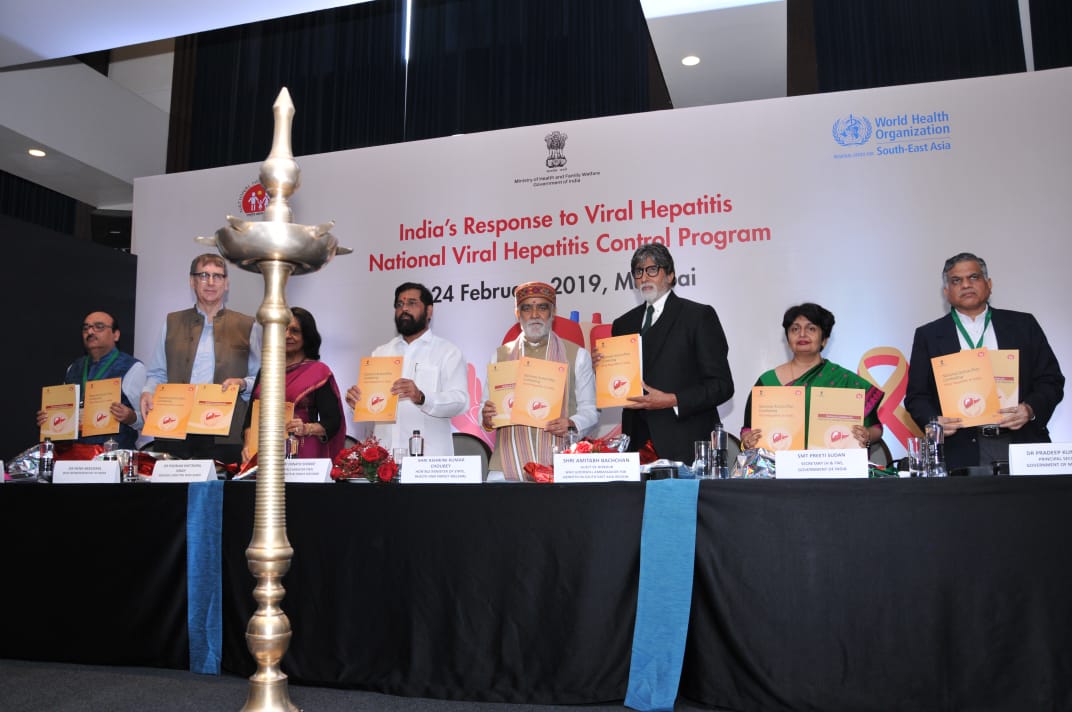
Another important strategy adopted by the program is propagating the use of Re-use Prevention (RUP) syringes in the country.
The NVHCP website was also launched on the occasion; the same can be accessed here – http://www.nvhcp.in.
The dignitaries distributed antiviral drugs for hepatitis to some select citizens.
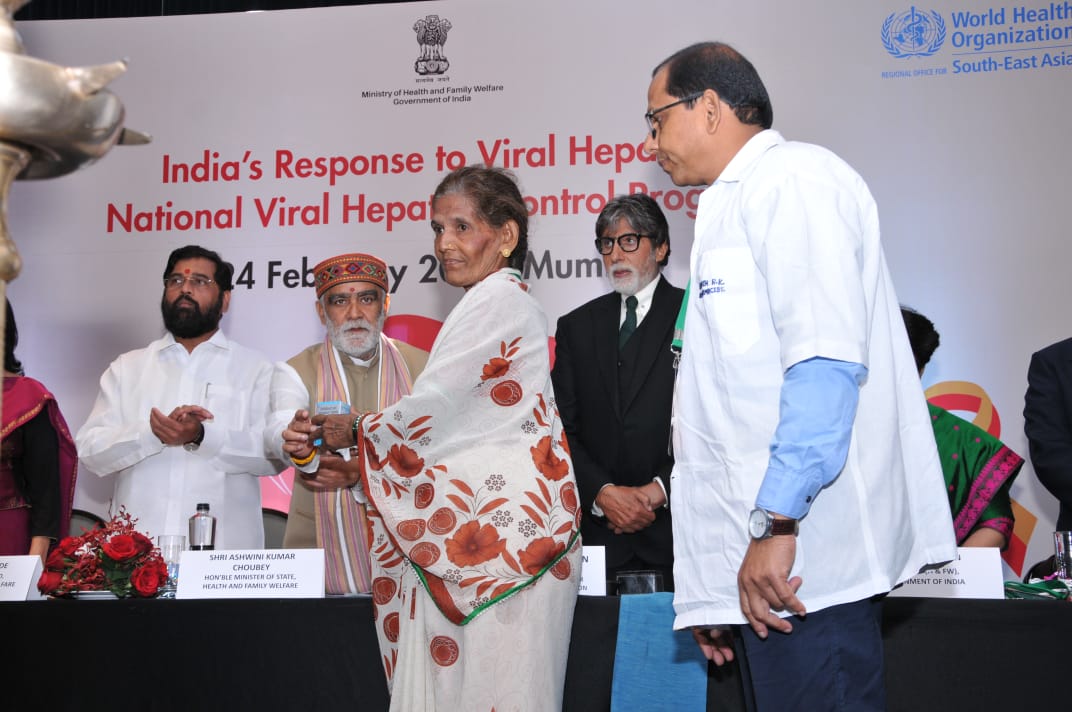
Addressing the gathering, the Union Minister Shri Ashwini Kumar Choubey said: “Today, we have taken a pledge to fight hepatitis; while we have done this in the presence of hundreds of people, the message should go to crores of people. This is important as one needs to maintain one’s health in order to be able to contribute to the society and to the nation. The launch of the National Action Plan – Viral Hepatitis takes forward the National Viral Hepatitis Control Program launched by the Union Health Minister in July 2018. The aim is to eliminate hepatitis by 2030. I am confident that the programme will be successful. India plans to have a decentralized health management for hepatitis, which is necessary for effective treatment. An integrated plan is being prepared, with the involvement of doctors, experts and state governments.
The human body is invaluable, the more it is used, the better it becomes. Our motto is Sarve Santu Niramayaha (health and welfare for all); keeping this in mind, we have come up with a National Health Policy aimed at affordable, effective and universal healthcare for all. The health expenditure has been increased over the years, and we are progressing towards health expenditure reaching 2.5% of GDP. Ayushman Bharat has been rolled out to ensure universal health coverage; under the programme, primary health centres are being upgraded into health and wellness centres. We aim to establish 1.5 lakh Health & Wellness Centres by 2022, out of which 10,000 are already operational; by March 2019, the number will become 15,000. These centres have diagnostic facilities for twelve illnesses.
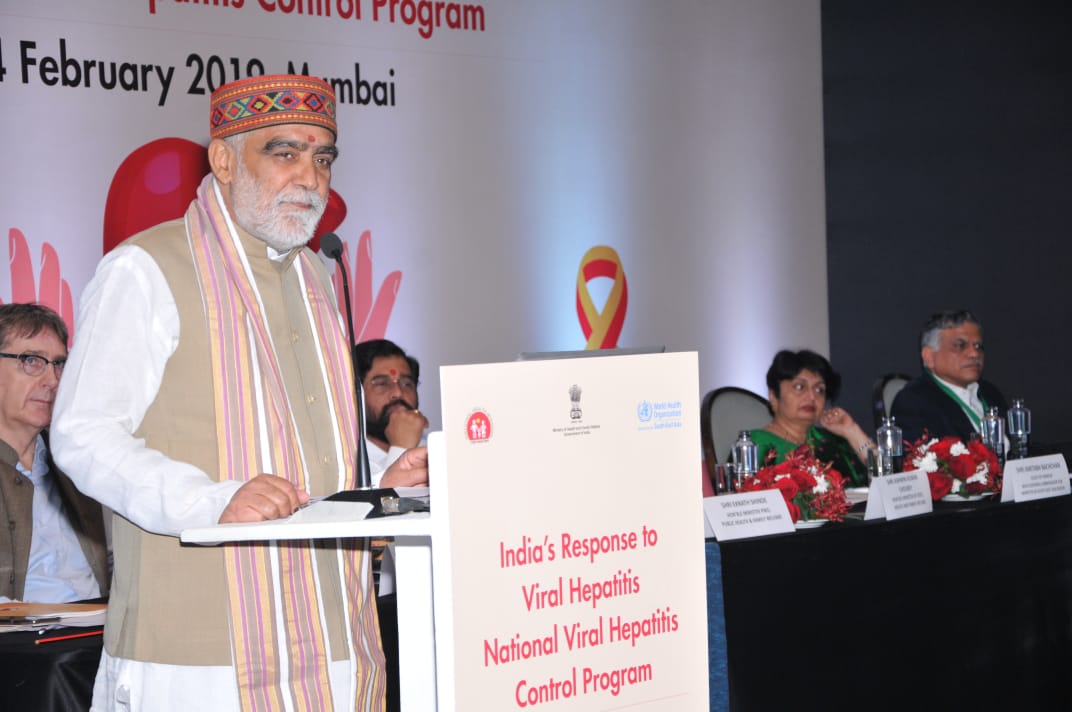
Indians have often had to sell their assets and other valuables in order to avail health treatment; more than 6 crore fall below poverty line due to the cost incurred on health problems. Ayushman Bharat will change this, it being the biggest health coverage programme offering 5 lakh rupees of health coverage per family per year, covering 50 crore people belonging to 10 crore families. The programme has already benefited 10 lakh people, 10,000 hospitals have already joined. Our aim is to offer a paperless and pocket-less health facility.”
The Maharashtra Health Minister Shri Eknath S. Shinde said: “I am quite confident that we will win the battle against hepatitis through NVHCP. When the whole country comes together for a cause, nothing can stop us from winning. Globally, 32 crore people suffer from hepatitis and 13-14 lakh deaths happen annually due to the disease. However, statistical data for India is missing in this regard; there is a need to bridge this gap. Sustainable Development Goals for leprosy and polio have already been achieved; similarly, SDG for hepatitis would also be achieved.
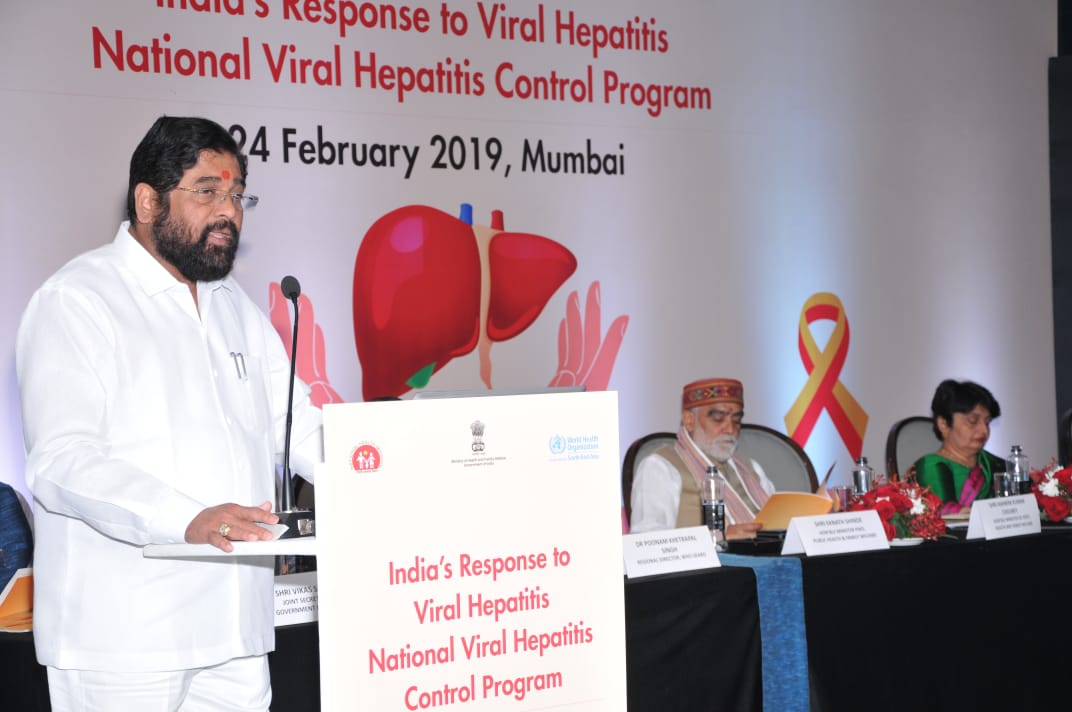
More than 151 health & wellness centres have been set up in the state under Ayushman Bharat, and more than 12,000 primary health centres and sub-centres in the state will be upgraded into health and wellness centres in the coming years.”
Goodwill Ambassador for Hepatitis, WHO SEARO region, Shri Amitabh Bachchan said: I am here today because I am a Hepatitis B victim. While shooting for the film Coolie, I got injured and required a lot of blood; the blood given by 200 donors saved my life, but one of the donors was carrying the Hepatitis B virus. The detection process for that virus was not in order at that time, and that went into my system. This was discovered only in 2005, when I came to know that 75% of my liver had been destroyed. I am a living example of a Hepatitis B victim. I want to know the impact of the campaigns; we had done a similar campaign against polio, and now India is now polio-free. I am a TB survivor too. If it can happen to me, it can happen to anyone since TB is normally regarded as a disease contracted by those living in disadvantaged backgrounds; however, if its treatment is done timely, it can be cured. We must pay a lot of attention to the process of detection of these diseases; because if it is detected in time, it can be cured.
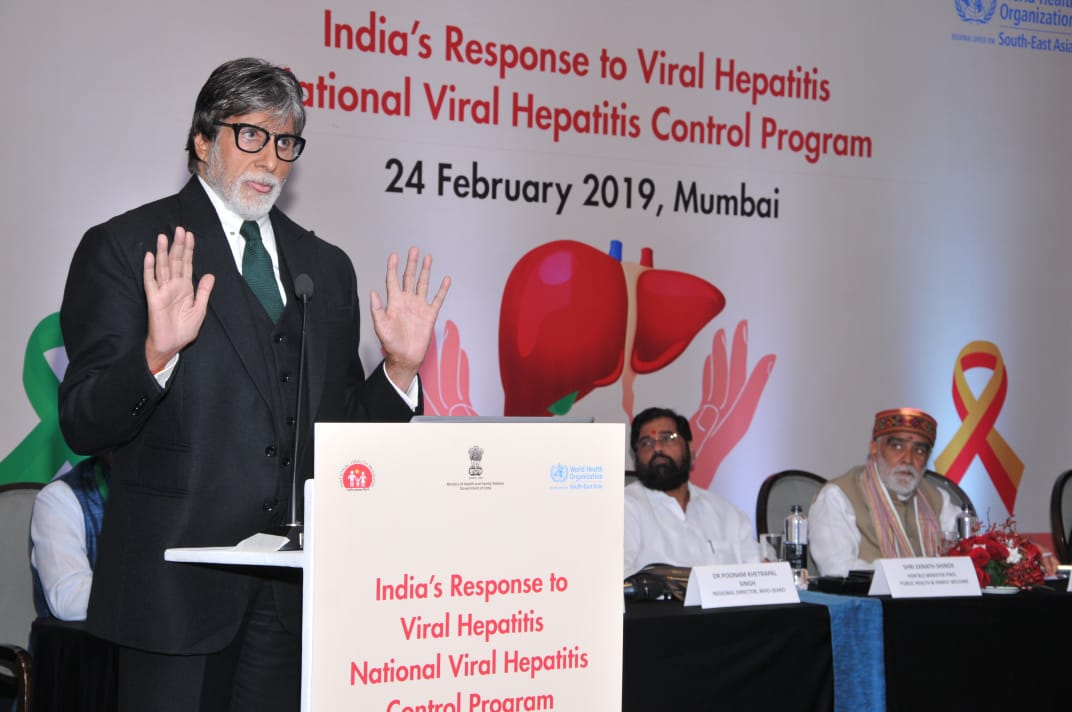
I got very interested when I came to know about the programme by Government of India. The need for dissemination of information about Hepatitis B is one thing which attracted me to the programme. Secondly, the factor of discrimination, particularly against women, made me sign in to this programme. I had heard many painful stories where women suffering from Hepatitis are evicted from the family. Women are half the power of our country; to be discriminated against just because they are carrying a Hepatitis B virus is not acceptable. I will fight for this as long as I am alive.”
Secretary, H&FW, Ms. Preeti Sudan said: “This is a start to fight against hepatitis together. Hepatitis is increasingly being recognized as an important public health problem. In India, the estimated burden of hepatitis is high, necessitating focus on prevention and control measures to mitigate morbidity and mortality arising out of hepatitis.
A National Steering Committee was formed to formulate the National Action Plan for Viral Hepatitis in January 2017. Various working groups were formed which looked at various thematic areas. The Plan was formed in consultation with nearly 110 experts, program managers, state officials and community members. Viral Hepatitis needs many stakeholders, it is a complex issue which we are trying to solve and contain through a multi-sectoral coordinated campaign. The detailed plan was concluded after several meetings. The framework was adopted in formalizing the National Viral Hepatitis Control Program which was launched in July 2018.
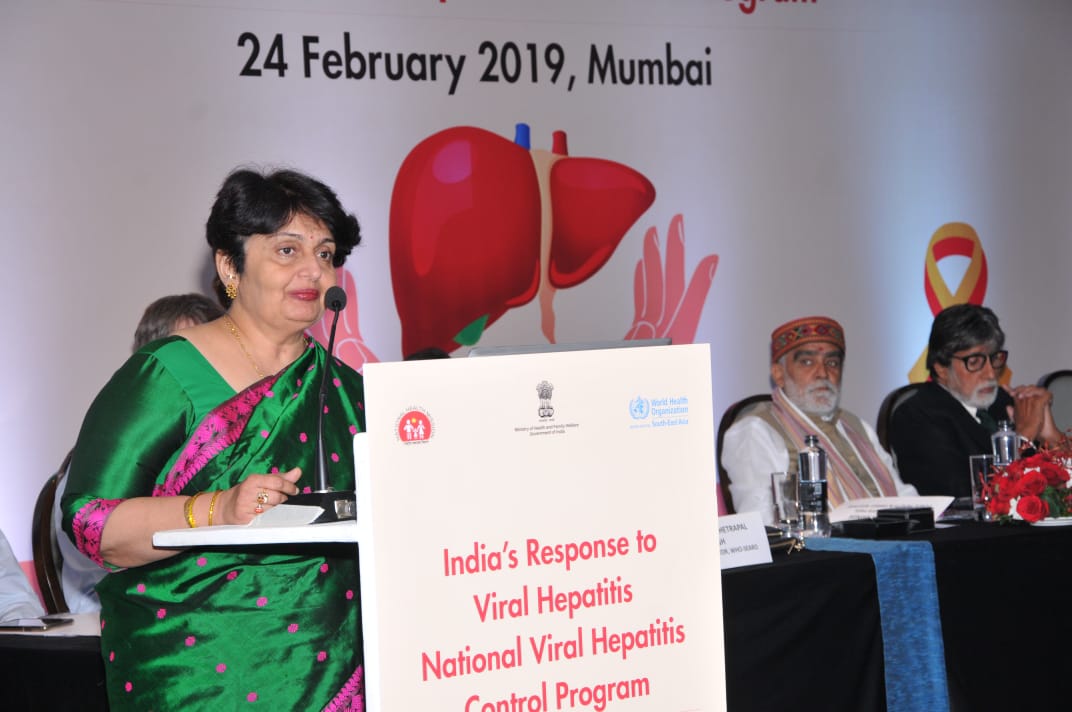
The Technical Guidelines is intended to serve as a reference document for practising physicians and provide standardized testing and treatment protocols to ensure consistency in diagnosing and treatment of the disease, in the scientifically most appropriate and cost-effective manner. This will be taken down to the lowest level of health care through the Ayushman Bharat programme. The guidelines released today will complement the general guidelines released earlier.
Thrust is now being given on improving the coverage of birth-dose for Hepatitis B, which will contribute to an early win for prevention. Vaccination against Hepatitis B to the health care workers and high-risk population will also be initiated under this program. No child should suffer from Hepatitis B.
The nation has made progress in improving blood transfusion safety, but much more needs to be done. The preventive, promotive and curative interventions need to come together, especially since symptoms for Hepatitis B and Hepatitis C often remain dormant for long.
I thank the generic drug manufacturers, due to whom the cost of the 84-day Hepatitis B vaccine dose has come down significantly. We need to use social media and field outreach through mobile vans of the Ministry of I&B to improve public awareness on the disease”.
Regional Director, WHO, SEARO, Dr. Poonam Khetrapal said: “Today is a very significant day. The number of people suffering from Hepatitis B is very large in India. This will augment India’s remarkable work in improving the lives of those suffering from Hepatitis B. SDG 3.3 emphasizes the need for all countries to strengthen their hepatitis programme. Government of India is also a signatory to the World Assembly Resolution 69.2 which aims to eliminate the disease from the world by 2030. India is the first country in the region to develop its own action plan for hepatitis, which is a notable achievement. India’s leadership is demonstrated in the comprehensive Programme launch last year, and the guidelines being released today, provide a guidepost to other countries for emulation. Mother-child transmission is the most common way in which the disease is spread; all blood donations must be voluntary and non-remunerative, thereby reducing the risk of blood-borne infections of hepatitis B. There is also a need to increase public awareness, given that only one in 10 people know of their hepatitis status. India’s efforts in this regard have been very inspiring.
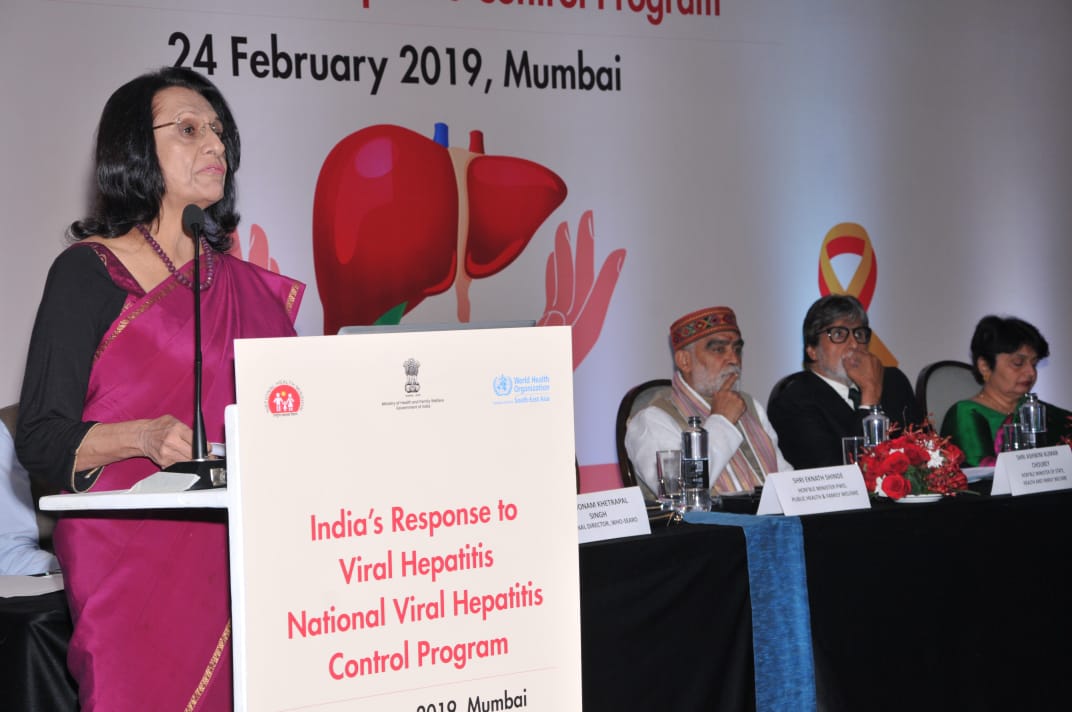
Just 3%-5% of those with hepatitis have been diagnosed; we need to scale up the programme, and reach those at risk. We look forward to the full implementation of the guidelines being released today, and their phased introduction into the health system of India. I thank Mr. Amitabh Bachchan for his commendable contribution in spreading the message of hope in battling hepatitis. I am confident that we will together win the battle against the disease”.
WHO Representative for India, Dr. Henk Bekedam said: “Hepatitis is very clearly on the agenda. The Ministry for Health & Family Welfare has moved very fast. The initiative launched on World Hepatitis Day is a great and comprehensive plan. It is wonderful to see India taking these efforts. Those in the Ministry raised the point that we do not have data on the number of people suffering from Hepatitis B. I commend the Ministry for taking the initiative to prevent Hepatitis B as well. Clean India is very important in this project. In a country where there are more than 4 million injections every year, making the injections safe would be an important step forward. The price reductions achieved in the vaccines is remarkable. The Action Plan is yet another initiative in ensuring a healthier India”.
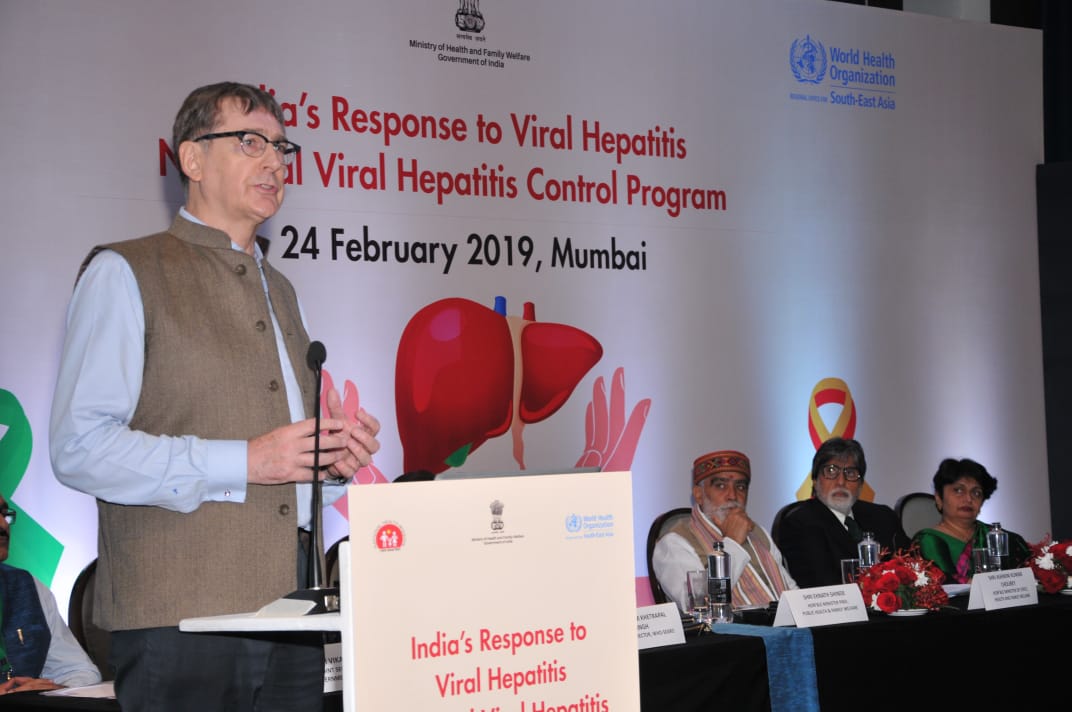
Earlier, Joint Secretary, MoHFW, Shri Vikas Sheel welcomed the audience and thanked all stakeholders who have contributed to the initiatives being launched today. The cost of treatment for Hepatitis B for one patient has come down to almost 35 dollars per course, from 800 dollars per course earlier. The Government of India has allocated Rs. 907 crore for this program for the next three years.
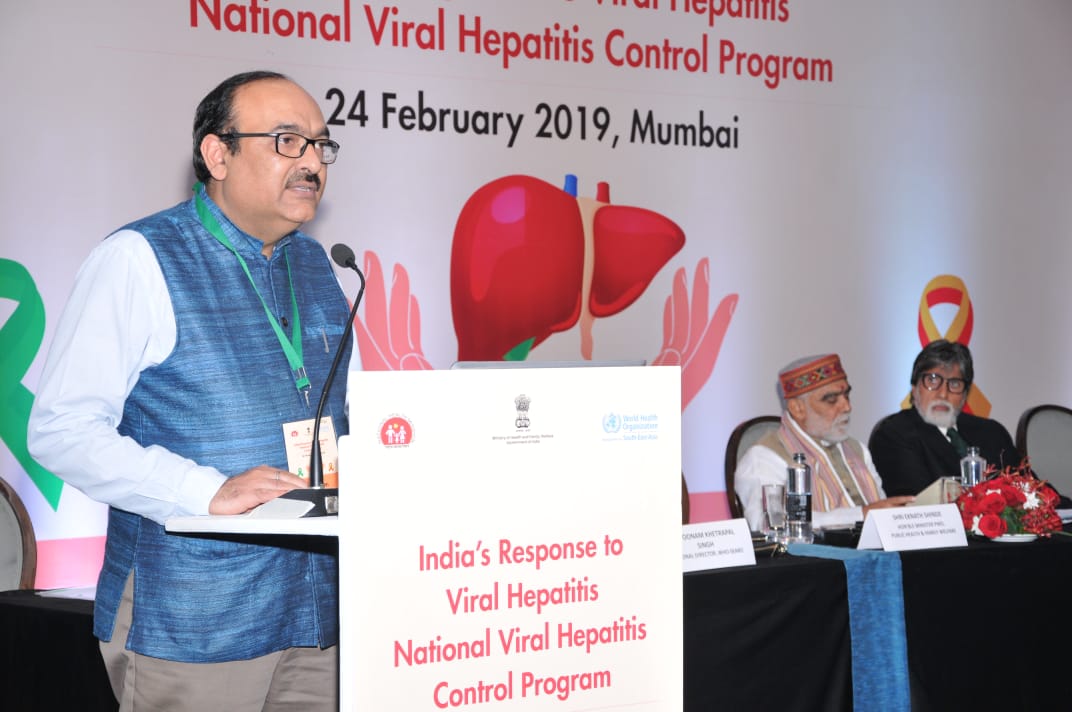
Principal Secretary, Maharashtra, Dr. Pradeep Vyas was also present on the occasion.
NVHCP epitomizes government of India’s deep commitment towards moving on path of elimination of viral hepatitis. MoHFW in partnership with the states is making all out efforts towards this endeavour. Effective participation between government of India, state governments and other stakeholders will progressively strengthen the program and will remain the hallmark for achieving the program’s aim.
***
DJM/MC/SP
(Release ID: 1566140)
Visitor Counter : 11598